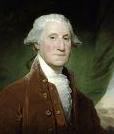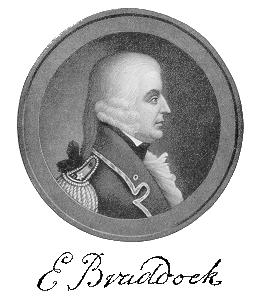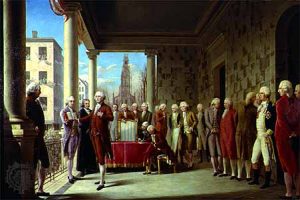 This month marks the 217th anniversary of George Washington’s famous Farewell Address ending his remarkable career of public service. To understand the impact of Washington’s unique leadership, it is worth reviewing a few incidents from his life.
This month marks the 217th anniversary of George Washington’s famous Farewell Address ending his remarkable career of public service. To understand the impact of Washington’s unique leadership, it is worth reviewing a few incidents from his life.
 George Washington began his military career as an officer over the Virginia militia and then later as an aide-de-camp to British General Edward Braddock during the French and Indian War.1
George Washington began his military career as an officer over the Virginia militia and then later as an aide-de-camp to British General Edward Braddock during the French and Indian War.1
Washington’s military advice in that War was very wise, but was rejected by the British.2 During the famous Battle of the Monongahela outside of Pittsburgh, Washington repeatedly escaped death through what he later described as miraculous intervention by God. In fact, an Indian chief who fought against him in that battle3 later traveled a long distance to meet Washington, whom he described as one who “cannot die in battle”4 because he clearly was “under the protection of the Great Spirit.”5 (For the full story of God’s Divine intervention in this battle, be sure to get the audiobook Bulletproof George Washington, read by famous Disney legend Dean Jones.)
Washington’s strong religious faith was evident on numerous occasions throughout the French and Indian War, and early artists later made lithographs capturing some of those reported incidents. One was a lithograph showing George reading the Bible to his troops, and another was Washington fulfilling the role of chaplain at the death of British commander Edward Braddock.
His firm reliance on God was evident throughout all of his endeavors, including in his General Orders to his troops during the American Revolution. And just as had occurred during the French and Indian War, God’s protection of Washington’s life was also evident during the American War for Independence.6
 Following the end of the Revolution and the writing and adoption of the Constitution, Washington was unanimously chosen as the nation’s first President — the only president to receive a unanimous electoral college vote.7 From his inauguration (which included seven distinctly religious activities) to his retirement from public service, George Washington repeatedly demonstrated his firm reliance on God, openly acknowledging Him in public prayer proclamations (such as those of 1789 and 1795), speeches 8 and messages. 9 So well established was Washington’s Christian character, that decades after his death, sermons were still being preached to honor his life.
Following the end of the Revolution and the writing and adoption of the Constitution, Washington was unanimously chosen as the nation’s first President — the only president to receive a unanimous electoral college vote.7 From his inauguration (which included seven distinctly religious activities) to his retirement from public service, George Washington repeatedly demonstrated his firm reliance on God, openly acknowledging Him in public prayer proclamations (such as those of 1789 and 1795), speeches 8 and messages. 9 So well established was Washington’s Christian character, that decades after his death, sermons were still being preached to honor his life.
Washington affirmed his strong religious beliefs in his final public message to Americans: his “Farewell Address” of September 17, 1796. That message is considered to be among the most significant political speeches ever delivered by any president,10 and subsequent presidents recommended to Americans that they read and study that Address.11 (We have it available in Documents of Freedom.)
Because of his significant influence, it is no surprise that Washington was lovingly titled by his contemporaries as the man who was “First in war, First in peace, First in the hearts of his countrymen.”12
Endnotes
1 David Ramsay, The Life of George Washington (Baltimore: Joseph Jewett and Cushing & Sons, 1832), 13; John S.C. Abbott, American Pioneers and Patriots. George Washington, or Life in America One Hundred Years Ago (New York: Dodd & Mead Publishers, 1875), 82, James K. Paulding, A Life of Washington (Alberdeen: George Clark and Son, 1848), 41-42.
2 Ramsay, Life of Washington (1832), 13-14; Abbott, American Pioneers (1875), 85-86; Paulding, Life of Washington (1848), 43-44.
3 Ramsay,Life of Washington (1832), 14-15; Abbott, American Pioneers (1875), 91-93, Paulding, Life of Washington (1848), 44-45.
4 George Washington Parke Custis, Recollections and Private Memoirs of Washington by His Adopted Son (New York: Derby & Jackson, 1860), 375; Eugene Parsons, Great Americans of History George Washington: A Character Sketch (Milwaukee, WI: H.G. Campbell Publishing Company, 1898), 30-31, Washington Irving, Life of George Washington (New York: G. P. Putnam & Co., 1856), I:368.
5 Custis, Recollections (1860), 375; Irving, Life of Washington (1856), I:368; Parsons, Great Americans of History (1898), 31.
6 See for example, Jared Sparks, The Life of George Washington (Boston: Ferdinand Andrews, 1839) 205-217; Hon. J. T. Headley, The Illustrated Life of Washington (New York: G. & F. Bill, 1859) 214-216.
7 James Grant Wilson and John Fiske, Appletons’ Cyclopedia of American Biography (New York: D. Appleton and Company, 1889), 6, “Washington, George.”
8 See for example, George Washington, A Compilation of the Messages and Papers of the Presidents, ed. James D. Richardson (New York: Bureau of National Literature, Inc., 1897), I:179, Reply of the President to an Address of the Senate, December 12, 1795.
9 See for example, George Washington, Messages and Papers of the Presidents, ed. Richardson (1897), I:44., First Inaugural Address in the City of New York, April 30, 1789.
10 “Washington’s Farewell Address,” Library of Congress: Religion and the Founding of the American Republic, (July 23, 2012); “February 22, 1862: Washington’s Farewell Address,” United States Senate.
11 See for example, James Madison, The Writings of James Madison, Letter to Thomas Jefferson, February 8, 1825.
12 Eulogies and Orations on the Life and Death of General George Washington, First President of the United States of America (Boston: Manning & Loring, 1800), 17, “Funeral Oration on the Death of General Washington. Delivered at the Request of Congress, Dec. 26, 1799. By Major-General Henry Lee.”
Still looking for answers? Visit our FAQ page
More Resources
Know the Truth and Protect Your Freedoms.
Still looking for answers? Visit our FAQ page
Stay Informed with the Latest Resources
Enter your email address to receive our regular newsletter, with important information and updates right in your inbox!










